Eco Certified
We test our products so you don't have to worry.
It should be easy for people to spot what makes a product eco. In addition to putting certifications on packaging we also publish the field test reports that we conduct with the CMA (Compost Manufacturing Alliance) We don't want people to just take our word for it - we want people to see the benefits of compostable and biodegradable materials.
 Click here to view our Tattooers Guide to Eco Products
Click here to view our Tattooers Guide to Eco Products






Transparency is our priority.
We will always disclose what our products are made of, how they will decompose and what conditions they require to do so. The following is a list of the compostable, biodegradable and environmental certifications each of our products hold under North American and European Union standards. The institutions our manufacturers have been certified through are official and recognized internationally. For more information on them scroll to the bottom of the page.
ASTM D6400 and ASTM D6868: The standard specification for solid material biodegradation (by composting) required for the labeling of plastics designed to be aerobically composted in municipal or industrial facilities. In order to compost satisfactorily, the product must demonstrate each of the three characteristics as follows: (1) proper disintegration during composting; (2) adequate level of inherent biodegradation; and (3) no adverse impacts on the ability of composts to support plant growth.
ISO 17088: Specifies procedures and requirements for the identification and labelling of plastics, and products made from plastics, that are suitable for recovery through aerobic composting. The four following aspects are addressed:
- biodegradation
- disintegration during composting
- negative effects on the composting process and facility
- negative effects on the quality of the resulting compost, including the presence of high levels of regulated metals and other harmful components.
EN 13432: The industrial standard to be met in order to claim that a plastic product is compostable in the European marketplace. In summary, it requires multiple tests and sets pass/fail criteria, including disintegration (physical and visual break down) of the finished item within 12 weeks, biodegradation (conversion of organic carbon into CO2) of polymeric ingredients within 180 days, plant toxicity and heavy metals. The ASTM6400 standard is the regulatory framework for the United States and as similar requirements. Additive-based bioplastics sold as photodegradable or Oxo-biodegradable do not comply with these standards in their current form.
ASTM D5526: The standard test method for determining Anaerobic biodegradation of plastic materials under accelerated landfill conditions. As degradation occurs inevitably in a landfill, it is of immediate concern that the plastic materials do not produce toxic metabolites or end products under the various conditions that have the potential to occur in a landfill. The mixtures remaining after completion of the test method, containing fully or partially degraded plastic materials or extracts, can be submitted subsequently to ecotoxicity testing in order to assess the environmental hazards posed by the breakdown of plastics to varying degrees in landfills. This test method has been designed to assess biodegradation under optimum and less-than-optimum conditions.
The test materials are mixed with pretreated household waste and exposed to a methanogenic inoculum derived from anaerobic digesters operating only on pretreated household waste. The anaerobic decomposition occurs under dry (more than 30 % total solids) and static nonmixed conditions. The mixtures obtained after this test method can be used to assess the environmental and health risks of plastic materials that are degraded in a landfill.Health Canada Number: DIN 02242474
A DIN uniquely identifies the following product characteristics: manufacturer; product name; active ingredient(s); strength(s) of active ingredient(s); pharmaceutical form; route of administration. A DIN lets the user know that the product has undergone and passed a review of its formulation, labeling and instructions for use. A drug product sold in Canada without a DIN is not in compliance with Canadian law. The DIN is unique and serves as a tool to help in the follow-up of products on the market, recall of products, inspections, and quality monitoring.
Eco Logo: UL 2794
This is the standard for sustainability for disinfectants and hard surface cleaners that have a reduced environmental impact. Environment Canada started this program in 1988, to provide information about environmentally-responsible products. The U.S. based for-profit Underwriters Laboratory (now UL) bought it in 2010.
UL 2794 is the standard certification for disinfectants cleaners that meet the strict requirements for eco-sustainability. Here are the major requirements these disinfectants must meet:
- Toxicity to aquatic and mammalian life;
- Biodegradability/breakdown, performance in the presence of soil;
- Low risk for promoting microbial resistance;
- District ingredients with negative impacts to air quality (VOCs);
- Human health (e.g., carcinogens);
- Packaging.
The test standards for biodegradability fall under ASTM D5660-96, ISO 11348 or EPS report 1/RM/24
Third Party Testing Partners
Biodegradable Products Institute
BPI is North America’s leading certifier of compostable products and packaging. Our certification program ensures that products and packaging displaying the BPI logo have been independently tested and verified according to scientifically based standards. We promote best practices for the diversion and recovery of compostable materials through municipal and commercial composting.
ASTM International
ASTM International, formerly known as American Society for Testing and Materials, is an international standards organization that develops and publishes voluntary consensus technical standards for a wide range of materials, products, systems, and services. Our glove manufacturers have the certifications D5526 D5511 E1963 from ASTM. Our barrier film and ink cap suppliers have the certification ASTM D6400 and/or D6868.
TÜV AUSTRIA (OK compost, Seedling & REAL)
TÜV AUSTRIA (formerly Vinçotte) is a certification body authorized by European Bioplastics and may therefore award the Seedling logo to products that are in compliance with EN 13432. By awarding both the OK compost INDUSTRIAL and the Seedling logo, TÜV AUSTRIA’s certificate holders have a way to give their compostable products recognition throughout the entire European market.

OK compost HOME is not based on a standard but is the basis for several standards!

It seems important to remember that the OK compost HOME certification program does not explicitly refer to a specific standard but details all the technical requirements that a product must meet in order to obtain the certification. It should also be remembered that, as a pioneer in this field, the requirements of the OK compost HOME program, defined in 2003 and never questioned since then, have served as the basis for the drafting of several standards such as:
- Australia: AS 5810 (2010) – Biodegradable plastics - Biodegradable plastics suitable for home composting
- France: NF T 51800 (2015) – Plastics - Specifications for plastics suitable for home composting
- Europe: prEN 17427 (2020) - Packaging — Requirements and test scheme for carrier bags suitable for treatment in well-managed home composting installations


